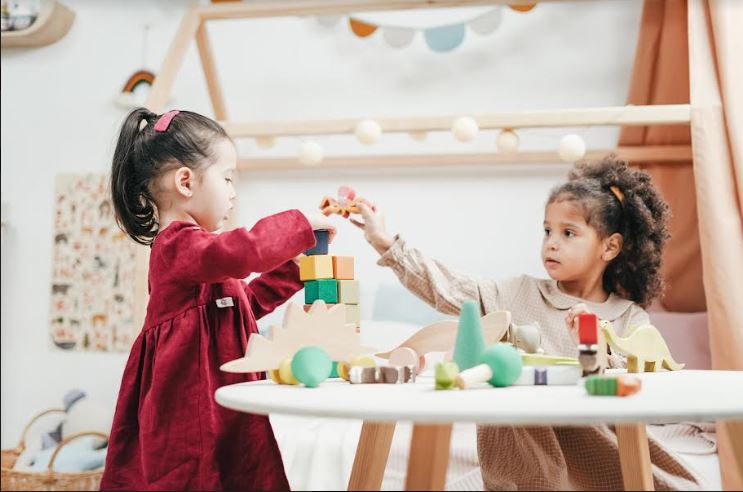Build a strong foundation for lifelong learning with our Early Childhood Education courses. Unlock the potential of young minds for a brighter future.
Parents are often concerned about their child’s educational, social and cognitive development. And rightly so, because if experts are to be believed, the future of a child largely depends on their early childhood education (ECE). The early childhood years are formative and significantly impact your child’s development. These years also influence their behaviour, attitudes, and learning ability.
This blog will enlighten you on some crucial aspects, like early childhood education and how to go about it to lay the right foundation for your kids.
What Makes Early Childhood Education (ECE) so Important?
Early life is characterized by fast brain growth and enormous learning capacity. It usually lasts from birth until age eight. Neuroscience research highlights the importance of these developmental years by highlighting how flexible the brain’s design is at this time. Positive and negative early experiences can influence the neural connections that influence a child’s cognitive abilities, emotional well-being, and social skills.
Early childhood education is a driving force behind the best possible development of the brain. Reputable ECE programmes offer an engaging atmosphere that fosters a child’s inquisitiveness, inventiveness, and capacity for critical thought. These programmes also provide a controlled environment where kids may learn critical social and emotional skills, preparing them for positive interactions and relationships for the rest of their lives.
Cognitive Development in Early Childhood
Children reach important developmental milestones in language learning, numeracy, and problem-solving abilities at this time. Age-appropriate activities are used in high-quality early childhood education programmes to promote intellectual growth and a love of learning in children from a young age.

Early on is a very important time for language development. In addition to improving a child’s communication abilities, exposure to a rich linguistic environment establishes the groundwork for reading. Children are guaranteed a strong linguistic foundation when they start formal school because of activities like storytelling, rhyming games, and interactive conversations that facilitate language learning and understanding.
In child care courses in Adelaide, numeracy skills—including fundamental mathematical concepts—are also taught. Children learn about numbers, shapes, and patterns via play and practical activities. These fundamental abilities facilitate the transition to increasingly complicated concepts during primary and secondary school by acting as building blocks for subsequent mathematical success.
Growth in Social and Emotional Domains
Early childhood education places a great deal of attention on social and emotional development in addition to cognitive development. Early life is a time of fast emotional growth. Therefore, providing a loving and supportive environment is critical to promote healthy emotional health throughout this time.
Activities that promote collaboration, sharing, and conflict resolution are incorporated into childcare courses in Adelaide. Children acquire social skills such as empathy and interpersonal navigation through play and peer engagement. In addition to being essential for academic achievement, the capacity to build strong bonds and work well with others is also essential for general well-being in later life.
Additionally, early childhood education gives kids a controlled environment to learn about and manage their emotions. Children need the guidance of teachers and carers to build coping mechanisms and resilience as they navigate emotional events. Navigating the difficulties of youth and adulthood requires the use of these emotional intelligence abilities.
Developing a Passion for Education
One of the fundamental aims of early childhood education is to instil a love of learning in children. Parents and childcare experts often struggle with generating curiosity among kids when it comes to learning. There are, however, some tried and tested methods that can be used. Give them an opportunity for play-based learning, activities, and tasks that provide them with meaningful engagement along with learning.
Throughout their educational experience, this passion for learning serves as a motivating factor, fostering a lifetime pursuit of knowledge and personal growth.
Participation of Parents and Community Assistance
Good early childhood education involves parents and the larger community in addition to the classroom. As a parent, you are crucial every step of the way. Yes, you heard that right. Child’s learning is more likely reinforced in their homes around their parents. So, have a better bond with their childcare educators, as your effective coordination can perform wonders in your child’s development.
You may also garner some support, as independent parenting can often get tough. So, work with local companies or communities, including schools and daycare centres. After all, we are social beings, more so when raising these young adults. Using your social skills better will not just ensure your child’s social and emotional development, but it will also offer you much-needed support.
Opportunities and Challenges in Early Childhood Education
So, how does childcare sound to you now? Easy right?
No, childcare is still tough, and parents will likely encounter different challenges at every step of the process. Every child is unique, so parents often need to develop unique ways to raise them.
However, some common difficulties like accessibility, price, and quality remain. Access to high-quality early development care disparities frequently mirror socioeconomic inequalities, restricting chances for some children. Furthermore, attracting and maintaining experienced instructors remains a concern, affecting overall care quality. Striking a balance between controlled learning and nurturing an atmosphere is equally difficult.
Want to Start Your Career in Childcare?
Completing child care courses is a pathway to a rewarding career in early childhood education. Certificate III in child care courses gives people the basic skills to nurture and educate the spirit of young people. Those aspiring to take leadership roles can further choose a diploma in early childhood education and care, which deepens pedagogical strategies and management aspects.
These courses in Adelaide provide a holistic understanding of child development, safety protocols and effective teaching methods. Aspiring childcare professionals can attend these accredited childcare courses in Adelaide to make a significant contribution to the growth and development of young learners.
Conclusion
Early childhood education shapes a child’s cognitive, social and emotional development and is the cornerstone of lifelong learning. Early Childhood Education (ECE) creates a nurturing and encouraging environment, motivates children to learn, and prepares them for success in school and life.
Recognizing the importance of early childhood education and investing in cutting-edge initiatives for all children is essential if we are to build a society that values education and fosters the full development of the youngest. Our knowledge from the early years and#039; the deep implications expand and with it the realization that investment in early childhood education is essential for the development of future generations of individuals and society.
